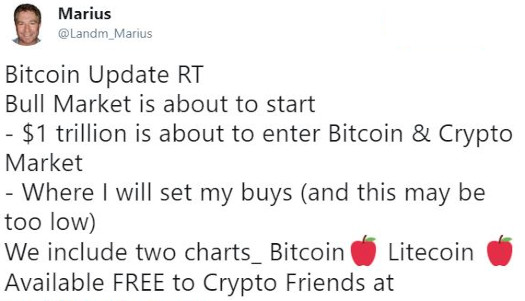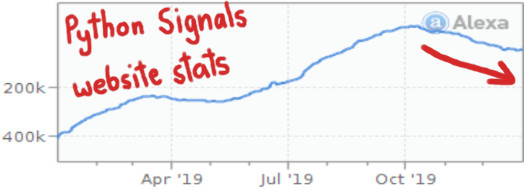Python Signals Review: Cryptocurrency signals pyramid scheme
 Python Signals operates in the cryptocurrency MLM niche.
Python Signals operates in the cryptocurrency MLM niche.
The company claims its headed up by executives Marius Landman, Gavin Victor and Enakirerhi Ejovwoke.

As far as I can tell Marius Landman was a marketing nobody up until a few years ago. He decided he was a cryptocurrency expert and has been shilling price predictions on Twitter over the past few years:

For some reason Landman is represented in Python Signals marketing as a Photoshopped head on a stock image suit:

In an April 2019 Python Signals webinar, Gavin Victor disclosed he was a participant in the Davor Coin, USI Tech and BitConnect Ponzi schemes.
Victor also discloses he worked closely with Enakirerhi Ejovwoke. Whether Ejovwoke was also involved in any of the above Ponzi schemes in unclear.
What we can confirm is Ejovwoke is Chief Marketing Officer of AgroStorm, a collapsed Nigerian investment opportunity.
Ejovwoke is also CEO of RealSearch and Partners, a blockchain development firm.
Despite representing it is based out of Mauritius on its website, Python Signals has strong ties to Africa through its executives (for some reason Australia is also mentioned):
All information stated here and in reports apply ONLY to the Australian jurisdiction.
Any ties Python Signals has to Mauritius appear to be shell company in nature.
Read on for a full review of Python Signal’s MLM opportunity.
Python Signals’ Products
Python Signals has no retailable products or services, with affiliates only able to market Python Signals affiliate membership itself.
Python Signals affiliate membership provides access to “bitcoin trend forecast and bitcoin price predictions”.
This appears to be the same free service Merius Landman has been promoting on Twitter over the past few years.
Python Signals’ Compensation Plan
Python Signals affiliates purchase 2×18 matrix position subscriptions.
- Gold – $150 (90 day subscription)
- Platinum – $250 (180 day subscription)
- Galaxy – $500 (12 months subscription)
- Diamond – $950 (24 months subscription)
- Lifetime Galaxy – $2000 (one-time subscription)
Recruitment Commissions
Python Signals affiliates are paid to recruit new affiliates.
Recruitment commission rates are determined by how much a Python Signals affiliate themselves spent on membership:
- Gold, Platinum, Galaxy and Diamond affiliates earn 10%
- Lifetime Galaxy affiliates earn 15%
Recruitment commissions are paid on subscription fees of personally recruited affiliates.
Residual Commissions
Python Signals pays residual commissions via a 2×18 matrix.
A 2×18 matrix places a Python Signals affiliate at the top of a matrix, with two positions directly under them:

These two positions form the first level of the matrix. The second level of the matrix is generated by splitting each of these first two positions into another two positions each (4 positions).
Levels three to eighteen of the matrix are generated in the same manner, with each new level housing twice as many positions as the previous level.
How many matrix levels a Python Signals affiliate can earn on is determined by how much they spend on their subscription:
- Gold position affiliates earn on up to nine matrix levels
- Platinum position affiliates earn on up to twelve matrix levels
- Galaxy and costlier position affiliates earn on all eighteen available matrix levels
Positions in the matrix are filled via direct and indirect recruitment of Python Signals affiliates.
Commissions are paid as positions are filled, based on the following percentages (paid out on subscription fees):
- levels 1, 4, 7, 10 and 13 of the matrix pay out 5%
- levels 2, 5, 8, 11 and 14 of the matrix pays out 4%
- levels 3, 6, 9, 12 and 15 of the matrix pays out 3%
- levels 16 and 17 of the matrix pays out 2%
- level 18 of the matrix pays out 1.5%
Rising Star Bonus
To become Rising Star qualified a Python Signals affiliate must buy in at Gold and recruit two Gold affiliates.
Once Rising Star qualified, an affiliate earns $5 or $20 each time anyone they personally recruit becomes Rising Star Bonus qualified.
- $20 is paid out if the affiliate qualified for the Rising Star Bonus within their first 30 days
- $5 is paid out if the affiliate qualified for the Rising Star Bonus after their first 30 days
Joining Python Signals
Python Signals affiliate membership is tied to a recurring subscription payment:
- Gold – $150 (90 day subscription)
- Platinum – $250 (180 day subscription)
- Galaxy – $500 (12 months subscription)
- Diamond – $950 (24 months subscription)
- Lifetime Galaxy – $2000 (one-time subscription)
The above subscription tiers also dictate a Python Signal affiliate’s income potential.
Conclusion
The MLM side of Python Signals operates as a pyramid scheme.
Affiliates sign up, pay a fee and get paid when others are recruited who do the same.
100% of commissions and bonuses are paid out of affiliate subscription fees, defining Python Signals first and foremost as a pyramid scheme.
The signals provided to Python Signals affiliates are neither here nor there, as they have nothing to do with the MLM opportunity.
They also might not work, as evidenced by Python Signals announcing it is “morphing” into something else:

The above is from a video published two days ago on Python Signals’ official YouTube account. Supposedly the reboot is happening on January 9th.
We did mention however that the signals are irrelevant. It is far more likely that Python Signals is rebooting because recruitment has stalled.

The above is an Alexa snapshot of estimated traffic to Python Signals’ website.
For an MLM pyramid scheme, a flatline or decline means collapse. Due to the nature of pyramid schemes requiring constant recruitment taking place to stay in business, constant growth is required.
This is obviously unsustainable.
A subscription-based MLM pyramid scheme will see those new to join stop paying subscriptions if they can’t recruit anyone.
This will see those above them in the company-wide matrix stop getting paid. If they can’t find anyone new to recruit, they too stop paying their fees.
Once this trickles far up along the company-wide matrix, Python Signals collapses.
Regardless of when this happens (or if it already has), a pyramid scheme always ends with the majority of participants losing money.
Again, I can’t speak to the quality of cryptocurrency trading signals Python Signals provides. Suffice to say any gains are likely to eventually be wiped out by ongoing subscription fees.
Let’s face it, if the signals were profitable Python Signals wouldn’t be rebooting.
Update 11th August 2020 – As of early 2020 Python Signals has been rebooted as Tonoit.

